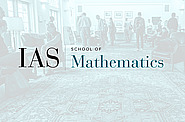Seminars Sorted by Series
Cluster-Polyfold Setup for Langrangian Floer Homology
Oct
12
2005
Cluster-Polyfold Setup for Langrangian Floer Homology
http://www.math.ias.edu/~wehrheim/cp/
9:00am|West Building Lecture Theatre
Oct
13
2005
Cluster-Polyfold Setup for Langrangian Floer Homology
http://www.math.ias.edu/~wehrheim/cp/
9:00am|West Building Lecture Theatre
Oct
14
2005
Cluster-Polyfold Setup for Langrangian Floer Homology
http://www.math.ias.edu/~wehrheim/cp/
9:00am|West Building Lecture Theatre
Collaborative Workshop in Algebraic Combinatorics
Collaborative Workshop in Algebraic Geometry
Combinatorics of Fundamental Physics Workshop
Nov
18
2024
Combinatorics of Fundamental Physics Workshop
Amplituhedra and Origami
Pavel Galashin
10:00am|Wolfensohn Hall
Nov
18
2024
Combinatorics of Fundamental Physics Workshop
Probing Moduli Space Cohomology Using Quantum Field Theory
Michael Borinsky
11:30am|Wolfensohn Hall
Nov
18
2024
Combinatorics of Fundamental Physics Workshop
Combinatorics of Symbol Alphabets in N=4 Yang-Mills
Anastasia Volovich
4:00pm|Wolfensohn Hall
Nov
19
2024
Combinatorics of Fundamental Physics Workshop
Kinematic Flow and Differential Equations for Cosmological Correlators
Austin Joyce
10:00am|Wolfensohn Hall
Nov
19
2024
Combinatorics of Fundamental Physics Workshop
Euler Discriminant of Complements of Hyperplanes
Claudia Fevola
11:30am|Wolfensohn Hall
Nov
19
2024
Combinatorics of Fundamental Physics Workshop
Non-Planar On-Shell Diagrams
Jaroslav Trnka
2:00pm|Wolfensohn Hall
Nov
19
2024
Combinatorics of Fundamental Physics Workshop
Canonical Forms of Oriented Matroids
Chris Eur
3:30pm|Wolfensohn Hall
Nov
20
2024
Combinatorics of Fundamental Physics Workshop
Hopf Algebras in the Cohomology of A_g
Melody Chan
10:00am|Wolfensohn Hall
Nov
20
2024
Combinatorics of Fundamental Physics Workshop
Cluster Structures on Kinematic Spaces
Lara Bossinger
11:30am|Wolfensohn Hall
Nov
20
2024
Combinatorics of Fundamental Physics Workshop
Adjoints and Canonical Differential Forms
Simon Telen
2:00pm|Wolfensohn Hall
Nov
20
2024
Combinatorics of Fundamental Physics Workshop
Adventures in Configuration Space
4:00pm|Wolfensohn Hall
Nov
21
2024
Combinatorics of Fundamental Physics Workshop
Combinatorics and Geometry of the Amplituhedron
Lauren Williams
10:00am|Wolfensohn Hall
Nov
21
2024
Combinatorics of Fundamental Physics Workshop
Loop Integration: Phenomenology, Polemics, and Prospects Ahead
Jacob Bourjaily
11:30am|Wolfensohn Hall
Nov
21
2024
Combinatorics of Fundamental Physics Workshop
Combinatorics on Words in String Amplitudes
Oliver Schlotterer
2:00pm|Wolfensohn Hall
Nov
21
2024
Combinatorics of Fundamental Physics Workshop
Topological Aspects in Algebraic Optimizations
3:30pm|Wolfensohn Hall
Nov
22
2024
Combinatorics of Fundamental Physics Workshop
Aspects of Correlators and Amplitudes
Song He
10:00am|Wolfensohn Hall
Nov
22
2024
Combined Members’ Seminar and Mathematical Physics Seminar
Feb
18
2009
Combined Members’ Seminar and Mathematical Physics Seminar
Generalizations to Boltzmann-Maxwell Interaction Dynamics
11:15am|S-101
Complex Algebraic Geometry
Sep
27
2006
Complex Algebraic Geometry
Polarized Logarithmic Hodge Structures and Enlargements of Griffiths Domain
Sampei Usui
2:00pm|Simonyi Hall Classroom - (S-114)
Oct
04
2006
Oct
25
2006
Nov
01
2006
Complex Algebraic Geometry
Locally Residual Currents and Dolbeault Cohomology on Projective Manifolds
1:00pm|S-101
Nov
08
2006
Nov
15
2006
Complex Algebraic Geometry
Compactification of Moduli Spaces of Drinfeld's Shtukas
Ngo Dac Tuan
1:00pm|S-101
Dec
07
2006
Dec
13
2006
Mar
07
2007
Complex Algebraic Geometry
Canonical Frames for Nonholonomic Vector Distributions
Igor Zelenko
1:00pm|S-101
Mar
14
2007
Complex Algebraic Geometry
On the Abel-Radon Transform of Locally Residual Currents with Respect to a Family of Complete Intersections
2:30pm|S-101
Apr
10
2007
Complex Algebraic Geometry
Wonderful Compactification of an Arrangement of Subvarieties
Li Li
2:00pm|S-101
May
22
2007
Complex Algebraic Geometry
Abelian Relations on Webs and Abelian Families of 0-Cycles
11:00am|Dilworth Room
Complex Geometry Seminar
Feb
08
2005
Feb
22
2005
Complex Geometry Seminar
Volume Minimization and Comparison for Isotropic Surfaces
Ed Goldstein
2:30pm|Fine Hall 110
Computer Science/Discrete Mathematics Reading Seminar
Jun
08
2021
Computer Science/Discrete Mathematics Reading Seminar
A Universal Law of Robustness via Isoperimetry - a paper by Bubeck and Sellke
10:30am|Simonyi Hall 101 and Remote Access
Jun
15
2021
Computer Science/Discrete Mathematics Reading Seminar
No seminar
10:30am|Simonyi Hall 101 and Remote Access
Jun
22
2021
Computer Science/Discrete Mathematics Reading Seminar
Tensor Rank
10:30am|Simonyi Hall 101 and Remote Access
Computer Science/Discrete Mathematics Seminar
Nov
29
2010
Computer Science/Discrete Mathematics Seminar
Self-Correction, Distance Estimation and Local Testing of Codes
3:15pm|S-101
Computer Science/Discrete Mathematics Seminar I
May
03
2004
Computer Science/Discrete Mathematics Seminar I
Fast Quantum Algorithms for Computing the Unit Group and Class Group of a Number Field
Sean Hallgren
11:15am|S-101
Sep
27
2004
Computer Science/Discrete Mathematics Seminar I
On the Measure of Interesting Families via Spectral Methods
11:15am|S-101

